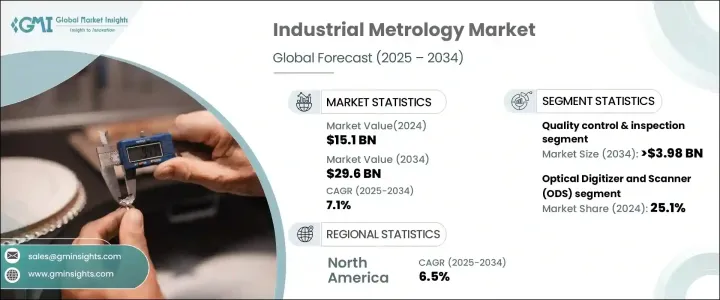
세계의 산업 계측 시장은 2024년에 151억 달러로 평가되었고, 2025년부터 2034년에 걸쳐 CAGR 7.1%로 성장할 것으로 예상됩니다.
이러한 성장은 제조 공정에서 정밀도와 정확성에 대한 수요가 지속적으로 증가함에 따라 촉진되고 있습니다. 업계에서 일관된 제품 품질과 엄격한 표준 준수를 지속적으로 우선시함에 따라 고급 계측 솔루션은 필수 불가결한 요소가 되었습니다.

첨단 기술의 통합으로 제조업체는 자동차에서 항공우주에 이르는 다양한 분야에서 높은 정밀도를 달성할 수 있게 되었고, 시장의 잠재력이 높아졌습니다. 정밀 계측 도구에 대한 이러한 집중은 시장 확대에 중요한 역할을 할 것으로 예상됩니다. 자동화와 인공지능(AI)도 계측 프로세스의 효율성과 정확성을 높이는 데 기여하면서 여러 산업 분야에서 산업 계측 도구에 대한 수요가 증가하고 있습니다. 산업이 발전하고 더 스마트한 제조 방법을 수용함에 따라 산업 계측 솔루션 시장은 향후 몇 년 동안 지속적인 성장을 보일 것으로 예상됩니다.
| 시장 범위 | |
|---|---|
| 시작 연도 | 2024년 |
| 예측 연도 | 2025-2034년 |
| 시작 금액 | 151억 달러 |
| 예측 금액 | 296억 달러 |
| CAGR | 7.1% |
산업 계측 시장은 장치별로 구분되며, 주요 범주에는 3D 계측기(CMM), 컴퓨터 단층 촬영, 광학 디지타이저 및 스캐너(ODS), 계측기, 엑스레이 및 자동 광학 검사, 형태 계측 장비, 2D 장비 및 기타 특수 도구 등이 있습니다. 이 중 광학 디지타이저 및 스캐너(ODS) 부문이 2024년 25.1%의 점유율을 차지하며 선두를 차지할 것으로 예상됩니다. 이러한 비접촉 계측 솔루션은 매우 정확한 데이터를 필요로 하는 산업에서 매우 중요하기 때문에 다양한 분야의 제조업체가 선호하고 있습니다.
용도별로 산업 계측은 리버스 엔지니어링, 매핑 및 모델링, 품질 관리 및 검사 및 기타 용도에 널리 사용됩니다. 특히 품질관리 및 검사 분야는 2034년까지 39억 8,000만 달러에 달할 것으로 예측되고 있습니다. 이러한 상당한 성장은 높은 제품 품질 유지와 안전 표준 준수의 중요성이 점점 더 커지고 있기 때문입니다. 자동화 기술과 AI 통합은 검사 프로세스의 효율성과 정확성을 향상시켜 운영을 더욱 간소화하고 문제를 더 빠르게 파악할 수 있게 해줍니다. 그 결과, 기업들은 경쟁력을 유지하고 산업 규정을 준수하기 위해 첨단 계측 솔루션으로 눈을 돌리고 있습니다.
미국의 산업 계측 시장은 예측 기간 동안 6.5%의 연평균 성장률로 성장하여 북미 시장에 크게 기여할 것으로 예상됩니다. 이러한 성장은 항공우주, 방위, 자동차 등 다양한 주요 부문의 강력한 수요에 의해 주도되고 있습니다. 스마트 제조 공정에서 계측 기술의 채택이 증가하면서 시장 확대에 박차를 가하고 있습니다. 또한 제조 역량을 발전시키고 혁신을 촉진하기 위한 정부 노력은 산업 계측 솔루션의 광범위한 구현에 도움이 되는 환경을 조성하고 있습니다.
The Global Industrial Metrology Market, valued at USD 15.1 billion in 2024, is poised for significant growth, with a projected CAGR of 7.1% between 2025 and 2034. This growth is fueled by the ever-growing demand for precision and accuracy in manufacturing processes. As industries continue to prioritize consistent product quality and adherence to stringent standards, advanced metrology solutions have become indispensable.

The integration of cutting-edge technologies has enabled manufacturers to achieve high precision in various applications, ranging from automotive to aerospace, thereby elevating the market's potential. This focus on precise measurement tools is expected to play a crucial role in the market's expansion. Automation and artificial intelligence (AI) are also contributing to the increasing efficiency and accuracy of measurement processes, boosting demand for industrial metrology tools across multiple industries. As industries evolve and embrace smarter manufacturing methods, the market for industrial metrology solutions is forecast to see sustained growth in the coming years.
| Market Scope | |
|---|---|
| Start Year | 2024 |
| Forecast Year | 2025-2034 |
| Start Value | $15.1 Billion |
| Forecast Value | $29.6 Billion |
| CAGR | 7.1% |
The industrial metrology market is segmented by equipment, with key categories including Coordinate Measuring Machines (CMM), computed tomography, Optical Digitizers and Scanners (ODS), measuring instruments, x-ray and automated optical inspection, form measurement equipment, 2D equipment, and other specialized tools. Among these, the Optical Digitizers and Scanners (ODS) segment is expected to lead, holding a 25.1% share in 2024. These non-contact measurement solutions are crucial for industries requiring highly accurate data, making them a preferred choice for manufacturers across various sectors.
In terms of application, industrial metrology is widely used for reverse engineering, mapping and modeling, quality control and inspection, and other applications. The quality control and inspection segment, in particular, is projected to reach USD 3.98 billion by 2034. This substantial growth is driven by the increasing importance of maintaining high product quality and compliance with safety standards. Automation technologies and AI integration are enhancing the efficiency and accuracy of inspection processes, allowing for more streamlined operations and quicker identification of issues. As a result, companies are turning to advanced metrology solutions to stay competitive and meet industry regulations.
In the United States, the industrial metrology market is expected to grow at a CAGR of 6.5% during the forecast period, making a significant contribution to the North American market. This growth is driven by strong demand across various key sectors, such as aerospace, defense, and automotive. The increasing adoption of metrology technologies in smart manufacturing processes is also spurring market expansion. Furthermore, government initiatives aimed at advancing manufacturing capabilities and promoting innovation are creating a conducive environment for the widespread implementation of industrial metrology solutions.